Spring Plant Sale
Ellen Honeycutt
Our Spring Plant Sale is coming up fast – it will be this Saturday at McFarlane Nature Park in Marietta (April 6th). This location has been a good one for us, with wide spaces, good parking, and a beautiful native garden around us. As before, sale hours will be from 10 am to 2 pm. We'll have thousands of plants at the sale, including approximately 500 native azaleas, plus many species of ferns, vines, perennials, shrubs, and trees – some of which can't be found elsewhere because they were rescued. Come early for the best selection and feel free to bring a wagon to cart off your treasures. Cash, checks, and credit cards are all accepted.
While our sale only lasts four hours, the preparation that it takes to get there lasts much longer! We couldn't do it without our volunteers, including people during the day of the sale on Saturday and for the setup on Friday. We could use a few more helpers for Saturday. If you have not volunteered for the plant sale before, it is not all hard work. We'll feed you lunch, and you'll have a chance to meet other GNPS members as well as customers who love to talk plants.
We look forward to seeing you at the spring sale. Tell your friends. Let's get more native plants into our gardens in 2019!
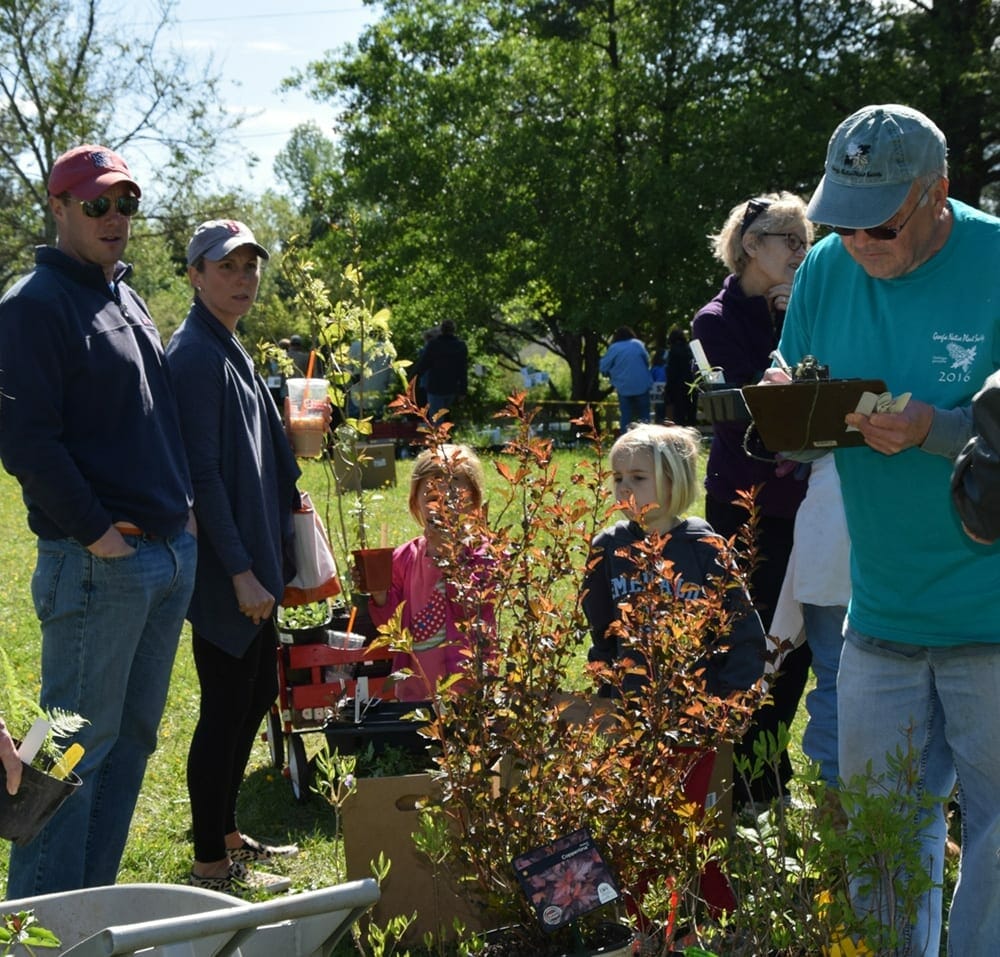
Chapter News: Coastal Plain
Symposiums and annual meeting
Gail Farley
March was "Symposium Month" for the Coastal Plain Chapter. GNPS counts on our chapter to help out with the annual Symposium in Macon, GA. At this year's sold-out event, CPC volunteers helped with setup, registration, table decorations and more. Our chapter's booth always has many visitors interested in native plants and the Georgia Native Plant Society. Visitors often sign up for future emails alerting them to chapter activities. It's a great way to build membership. We are also trying to build interest in insect pollinators of native plants as we approach the first ever Great Georgia Pollinator Census on August 23-24.
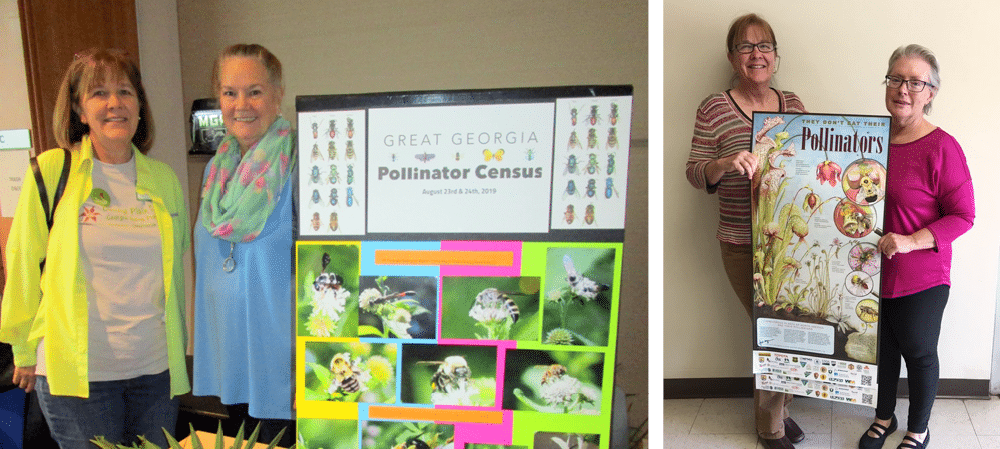
Left: Amy Heidt and Eleanor Sikes at Symposium chapter booth. Right: Karan Rawlins awarding poster to Amy.
The table centerpieces Amy Heidt brought for all 41 Symposium tables were a huge hit. The resurrection fern and wood blocks were from the many trees that fell on their property during the last hurricane. And of course who doesn't have lots of palmetto? Amy's centerpieces were so popular that guests asked to buy them. So Amy put a price of $10 on each; sold them all and our chapter enjoyed the unexpected $410 financial windfall. For Amy's cleverness and out-of-the-box thinking, she was awarded an Einstein 'You're a Genuis' award at our 1st chapter meeting of 2019! Thank you, Amy!!!
The South Georgia Native Plant and Wildflower Symposium, Wednesday, March 27 in Tifton, Georgia was our second symposium of the month. This event also includes the first of two annual chapter meetings. Members who attended were mostly from the local area, but here are some meeting highlights for those unable to attend:
- Election of officers and directors will be held at the Coastal Plains Chapter November 2019 business meeting in Brunswick, Georgia. Karan Rawlins has agreed to chair the nominating committee and has announced recommendations for officers and director be sent to her. Karan’s contact information is: krawlins@uga.edu. All positions will be open except for president, since Heather Brasell (now vice-president and president-elect) will assume this important job at our November meeting. Members can nominate themselves or others, with their permission.
- Mary Alice Applegate, member and artist, was honored for her artwork on our chapters logo – Lilium catesbaei or Pine Lily. Many of us wore our chapter t-shirts with Mary Alice’s artwork.
- Heather Brasell spoke about a new online publication – “Southern Soil”. Several members have volunteered to write native plant articles for this bi-monthly magazine. If you’d like to research and write about a favorite coastal plain native plant, please contact Heather Brasell at heather.brasell@gmail.com.
- Heather’s annual “Day in the Woods” event at Gaskins Forest Education Center in Alapaha, GA will be Saturday, April 13. Our chapter will have a booth and giving away free plants members have donated. If you’d like to join us at the booth and/or donate plants, please contact Amy Heidt at ameidty@bellsouth.net. There are so many interesting and unusual events at Day in the Woods, it’s worth your while to make the drive. There are several selections of wild meat cooked various ways. And everything is free!.
- Amy Heidt announced that chapter plant sales and booth at Tifton Farmer’s Market will be coming up soon. Amy counts on members to donate plants. Half or more of our annual income is from plant sales. Please think about helping out Amy with plants from your yard.
- Finally, Heather Brasell will plan our fall business meeting; she’s thinking about a hands-on style format rather than the typical speaker format. Again, the business meeting will feature election of officers and directors, as noted above.
Special thanks to Amy Heidt
Karan Rawlins
The special Pollinator.org poster shown (above, right photo) was created by Teri Nye, who competed with many other artists across America for her design “They Don’t Eat Their Pollinators” to be accepted. The poster is an original watercolor painting by Teri. It is the only poster that was designed from a painting and only the second one in their history to be ‘Sold Out”. They do not actually sell the posters, but they can run out of them. I ordered several of these ‘Pitcher Plants and Their Pollinators’ posters to use as special gifts. I was lucky enough to also know the artist, Teri Nye who graciously signed the posters for me.
All of that is to say I wanted to give one of these special posters to Amy Heidt for all of her work to help make the Coastal Plain Chapter of the Georgia Native Plant Society a success. We are lucky to have many good people giving freely of their time and talent to help our chapter grow, but everyone will tell you Amy has gone far above the call of duty. She has collected seed; grown plants; planted those plants in south Georgia state parks and as Connect to Protect projects at schools; worked on plant rescues; attended many meetings and symposiums; and given talks to many groups across south Georgia. She has served on the CPC board as President, Vice President and Secretary. She has led plant sales at the local Tifton Farmer’s Market and over on the Georgia coast. She has driven to native plant nurseries to have a variety of special plants for educational displays. She has planned and executed meetings, workshops and symposiums. She has helped educate people across south Georgia on the importance of including native plants in their landscapes. And in her spare time she works on conservation projects across the state. Her husband Paul Sumner has been by her side through most of this work and bless him, he doubled the size of her greenhouse for her Christmas present one year. In a stroke of genius, Amy and Paul cut up a pecan tree which was covered with resurrection fern, that they lost in the tornado, into small chunks which they used to create the center pieces for the annual GNPS Symposium. They then sold off those chunks of bark covered with resurrection fern raising just over $400 for the CPC. And on top of all that she is a really good friend.
New Pollinator Garden Underway at Tifton Elementary School
Mary Alice Applegate
A new native plant garden is underway at the Matt Wilson Elementary School in Tifton, with help from the Coastal Plain Chapter. The garden’s plan is in accordance with the UGA Botanical Garden’s “Connect to Protect” program guidelines, with Georgia native plants selected to bloom in three seasons, and including several host plants for pollinators. Many of the twenty species selected for the garden were propagated by local chapter members.
The garden will be adjacent to the school’s existing vegetable garden, and will tie in to an existing irrigation system, according to Penny Peters, the school’s gardening / art teacher. Students will help plant and care for the garden and will learn about the roll of pollinators in Georgia’s agriculture.
Plant Spotlight: Spring Phloxes
Ellen Honeycutt
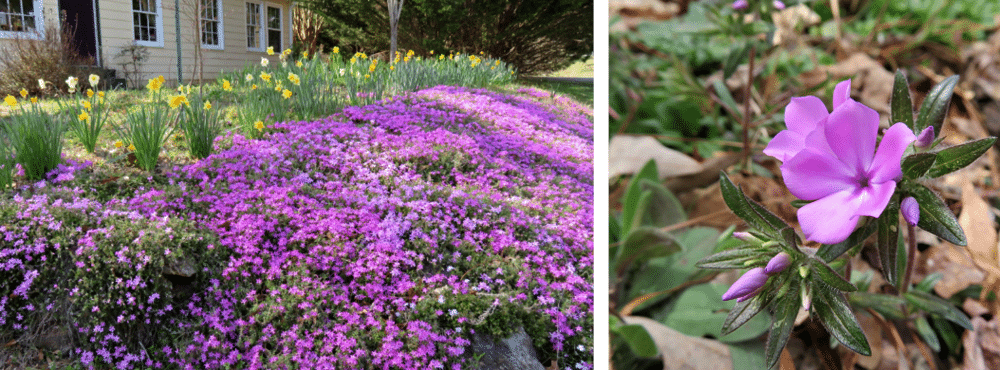
Left: Moss phlox (Phlox subulata), spreading over a slope. Right: Sun-loving hairy phlox (Phlox amoena).
Phlox is an almost uniquely North American plant, with 61 species in all, and Georgia has a respectable selection of spring and summer-blooming species throughout the state. This month we’ll talk about the spring species, and perhaps no single one is more well-known than moss phlox, Phlox subulata. This species is found in many landscapes, both old and new, where it bursts into a carpet of pink in March (for some strange reason, a local common name for it is ‘thrift’). Its low-growing evergreen leaves are almost unnoticed the rest of the year. Trailing phlox, Phlox nivalis, closely resembles it but the vast majority is marketed as Phlox subulata. Both are sold in hues of pink ranging from almost white to deep pink. Nurserymen are also breeding other color forms now. Both of these species grow best in full sun. A cemetery near me has lots of Phlox nivalis growing among the headstones and the color variations are delightful.
Shadier landscapes are perfect for the two blue woodland phlox species: Phlox divaricata (woodland phlox) and Phlox stolonifera (creeping phlox). As you might expect from the name, P. stolonifera spreads to form a nice groundcover, with short flowering stalks held above the plant. Woodland phlox is more clump-forming and is a taller plant than creeping phlox. I love to see Phlox divaricata blooming in Cloudland Canyon State Park in April. Once I saw an early butterfly flitting from flower to flower.
The tallest of the spring phlox is smooth phlox (Phlox glaberrima). It grows up to 3 feet in part sun, creating a handsome plant in the May garden. It often has deep pink flowers. While I haven’t seen it sold much in the past, this species seems to be getting more attention lately by propagators so hopefully we will see it sold more often.
The last two spring phlox species are sun-loving ones. Hairy phlox (Phlox amoena) and downy phlox (Phlox pilosa) are both fairly short and have deep pink flowers. Both have fine hairs on the stems and leaves, and both are fairly well-distributed in the state. Whichever one you get, they are both superb garden plants as are all the species discussed here.
So, if you don’t have any spring phlox in your landscape, now is the perfect time to hit the spring plant sales and find some. Nearly Native Nursery is an excellent place to check for it year-round while Chattahoochee Nature Center has been growing it for spring sales. A good reference book for phlox is “Phlox: A Natural History and Gardener's Guide by James Locklear (2011).”
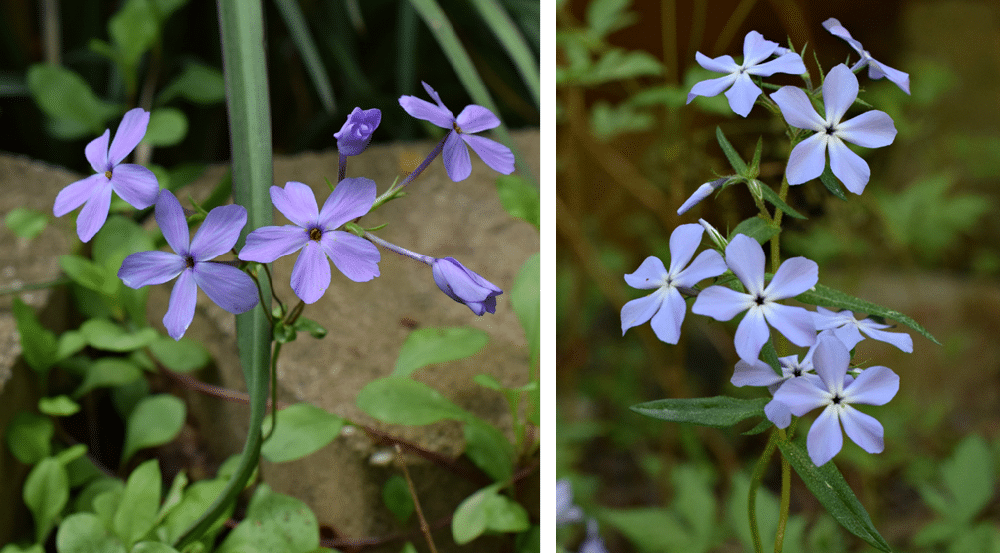
Two blue phlox species. Left: Phlox stolonifera (creeping phlox). Right: Phlox divaricata (woodland phlox)
Coastal Plain Certificate in Native Plants
Heather Brasell
The Certificate of Native Plants is now being offered in South Georgia. focused on Coastal Plain habitats. Several members of the Coastal Plain chapter of GNPS, including Amy Heidt, Amy Carter, Paul Sumner, Ellen Corrie, Heather Brasell, Katherine Melcher and Karan Rawlins, are part of the organizing team. For several years, the certificate has been offered through UGA’s State Botanical Garden (SBG) in Athens. Now, with support and supervision from SBG, the certificate is being offered in Tifton. The Tifton program is administered through UGA-Athens, and requirements for certification are the same as the Athens program. Core courses within the certificate are the same content; elective courses are similar but focus on Coastal Plain natural communities. The program is designed so that participants can complete the program within a year or take as long as they need. Credits for courses are fully transferrable between Athens and Tifton. Details are available online at www.botgarden.uga.edu or contact Sean Cameron at 706-542-6156 or cscamero@uga.edu
The three courses so far have been well attended and feedback has been enthusiastically positive. For the first course on Winter Tree Identification, Kip Hall from Abraham Baldwin Agricultural College brought in a dozen specimens that demonstrated varied leaf scars, buds, and twigs. Participants examined these samples and compared them with diagrams of plant characteristics used in descriptions in field guides. A short field trip provided opportunity to look at bark characteristics of trees and to use a simple taxonomic key to identify trees.
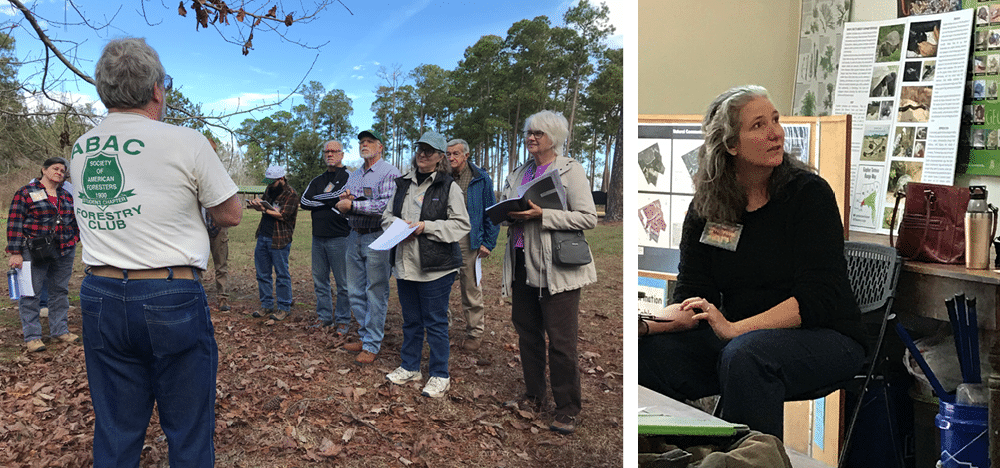
Left: Kip Hall leads a field trip in the Winter Tree Identification course. Right: Katherine Melcher presents a session of the Natural Communities course.
The second course, Natural Communities, was taught by Katherine Melcher, University of Georgia at the Gaskins Forest Education Center in Alapaha. Katherine provided a clear framework for understanding different communities by first comparing ecoregions within Georgia in terms of geology, soils, topography, climate, hydrology, and more. This provided a foundation for focusing on communities in the Coastal Plain, where the most important factors are soil moisture and frequency of fire disturbance. For the field trip component, participants loaded onto a hay wagon to visit a variety of habitats ranging from upland hardwoods to riverine, with several wetland communities in between.
The third course, Native Medicinal Plants, was taught by Richard Carter at Valdosta State University. Richard provided a thumbnail version of the course he teaches at VSU. After providing a background in the history of medicinal plants and taxonomic naming systems, he described 68 plants native to Georgia or plants with close relatives native to Georgia. For each plant, he provided information about what claims have been made about medicinal properties, what active ingredients have been isolated, and how the plant has been marketed (if at all). Finally, he provided research results about the efficacy of a few plants. In most cases, the results were ambiguous or provided little or no positive effects.
The next two courses will be offered in April. An elective course on Altama Grit will be taught by Frankie Snow, South Georgia State College, on April 6. He will lead a field trip to Broxton Rocks. The next core course will be Basic Botany, taught by Jason Scott on April 27. We would love to have you join our program in South Georgia.
Correction
Our last issue stated that bumblebees would utilize bee hotels. Although many species of important solitary native bees will use these bee blocks, bumblebees are social insects, preferring existing cavities like abandoned mouse nests. |